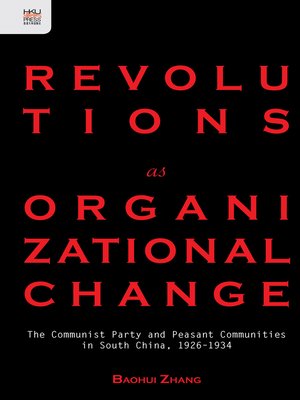Revolutions as Organizational Change
ebook ∣ The Communist Party and Peasant Communities in South China, 1926–1934
By Baohui Zhang

Sign up to save your library
With an OverDrive account, you can save your favorite libraries for at-a-glance information about availability. Find out more about OverDrive accounts.
Find this title in Libby, the library reading app by OverDrive.



Search for a digital library with this title
Title found at these libraries:
| Library Name | Distance |
|---|---|
| Loading... |
By comparing peasant revolutions in Hunan and Jiangxi between 1926 and 1934, Revolutions as Organizational Change offers a new organizational perspective on peasant revolutions. Utilizing newly available historical materials in the People's Republic of China in the reform era, it challenges the established view that the great Chinese revolution of the twentieth century was a revolution "made" by the Chinese Communist Party (the CCP). The book begins with a puzzle presented by the two peasant revolutions. While outside mobilization by the CCP was largely absent in Hunan, peasant revolutionary behaviors were spontaneous and radical. In Jiangxi, however, despite intense mobilization by the CCP, peasants remained passive and conservative. This study seeks to resolve the puzzle by examining the roles of communal cooperative institutions in the making of peasant revolutions. Historically, peasant communities in many parts of the world were regulated by powerful cooperative institutions to confront environmental challenges. This book argues that different communal organizational principles affect peasants' perceptions of the legitimacy of their communal orders. Agrarian rebellions can be caused by peasants' attempts to restructure unjust and illegitimate communal organizational orders, while legitimate communal organizational orders can powerfully constrain the mobilization by outside revolutionary agents such as the CCP.






